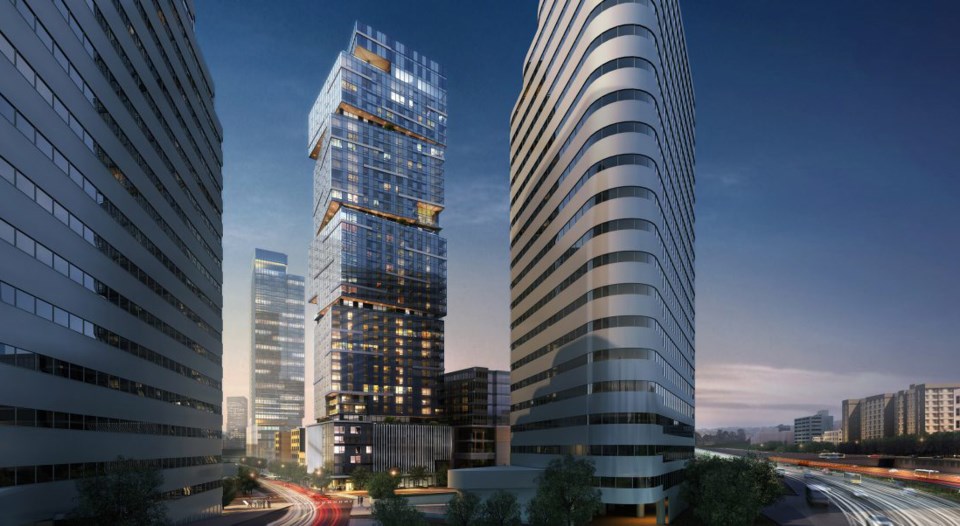Twenty years ago, a partnership between West Vancouver’s Don Milliken and Seattle’s Vulcan Inc. – the development company of Microsoft co-founder Paul Allen – set the stage for 2200 Westlake in Seattle’s Denny Triangle, an area previously known for car dealerships and single-storey light-industrial buildings.
The groundbreaking project completed in 2006, creating a 975,000-square-foot mixed-use community. Those were heady times for real estate, with the project’s 261 condo units selling for an average of 15 per cent above the offering price.
Since 2010, Milliken has focused on housing for seniors with projects in Calgary and West Vancouver, but the area around 2200 Westlake has continued to grow up. Towers of more than 40 storeys are transforming the neighbourhood, with Vancouver developers Westbank Corp., Concord Pacific Developments Inc. and Bosa Development Corp. all active in the vicinity.
This year, Christian Chan, who took the helm of Burrard Group as CEO at the beginning of August, will complete construction of Nexus, a striking 41-storey condo tower with 417 units, just off the I5.
The developments stand out as opportunities for home ownership in a market that, unlike Vancouver, has tended to see a greater volume of rental construction. Some of the momentum behind the activity stems from changes to state legislation creating greater safeguards for the building corporations that end up operating the communities once the developer steps away.
“We felt we were very supported by the city in building condos,” Chan said. “The city and the community at large feels that it’s important to have both rental and purchase product.”
Bringing new units to market also feeds demand as the economy keeps on chugging along.
“It really is driven by strong, local economic fundamentals,” he said. “You can see people working hard, making money, being able to afford to live in the city, which… maybe isn’t always the case in Vancouver.”
The final 28 units at Nexus were recently released to the market, after the first 389 sold for prices in the range of $300,000 to $1.5 million, or about $700 to $800 a square foot. The remaining units are priced at $1 million to $2.7 million.
Whither buyers?
While the Burrard Group keeps pace with local demand in the Seattle market, a pitch received last week was headlined “Vancouver’s out, Seattle’s in.” It claimed that “new policies and taxes curbing the influx of foreign ownership in Vancouver” had sent international investment interest south to Seattle and other cities on the U.S. West Coast.
The pitch came with a quote from Dean Jones of Realogics Sotheby’s International Realty, a veteran of local real estate marketing who won a gold award for his work on 2200 Westlake (in partnership with Vancouver’s Cliff Bowman). According to Jones, “buyers from Canada and Asia do represent a notable, if not significant, amount of demand for pre-sale condominium projects.”
This stands alongside comments Jones made last month, which indicated that Asian buyers were leaving Vancouver for Seattle in droves.
“Vancouver is now far more expensive, burdened by foreign-buyer taxes, and has less growth potential,” he said. “I see Seattle as the new Vancouver. We are seeing the same growth with Chinese investors who have discovered our market as Vancouver had back in 2015.”
But numbers from Juwai Ltd., which operates an online platform marketing international properties to Chinese buyers, stand in contrast to those claims. Queries through Juwai.com indicate a resurgence of interest among Chinese buyers in Vancouver over the past year. During the second quarter, interest increased fourfold. Interest in Seattle, meanwhile, was stable.
“Our data shows that Chinese buying interest in Vancouver is rebounding strongly from the low levels reached during 2017,” remarked Juwai executive chairman Georg Chmiel.
While the interest may not result in sales, the rebound is significant – indeed, the most significant in any West Coast market or Canada.
Property transfer data from the B.C. Ministry of Finance indicates that foreign nationals were involved in just 2.6 per cent of residential transactions in Metro Vancouver during the first seven months of 2019.



